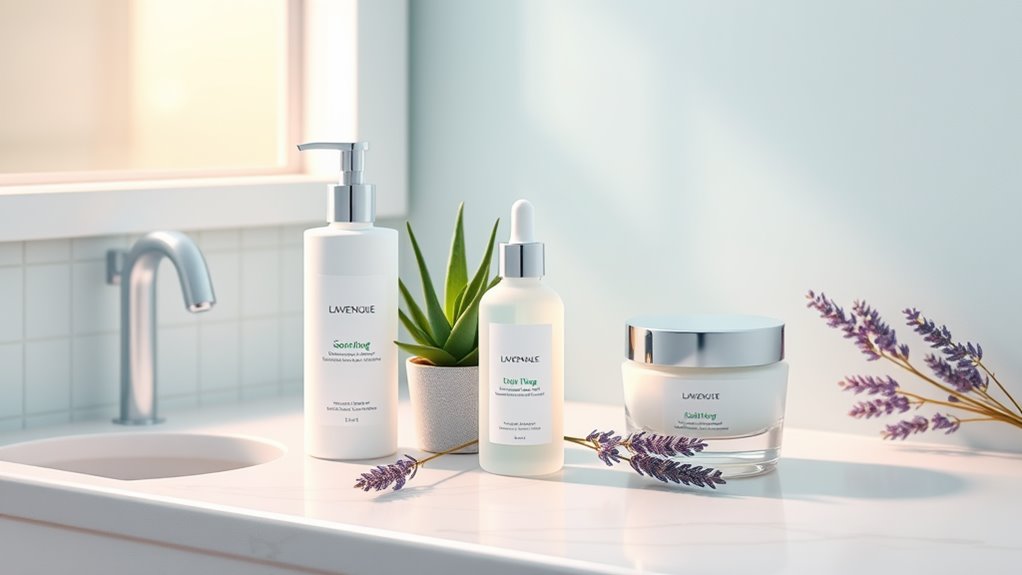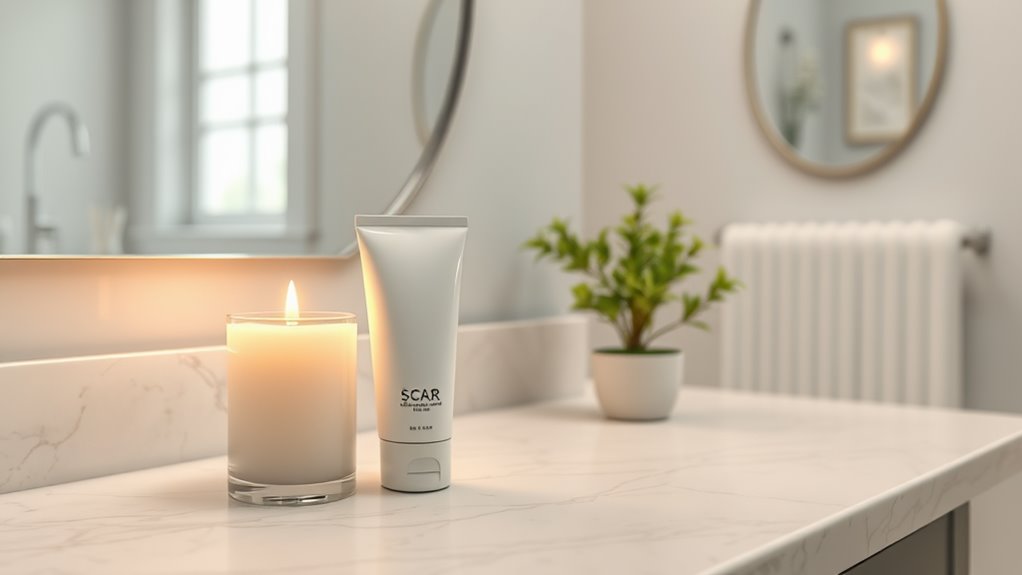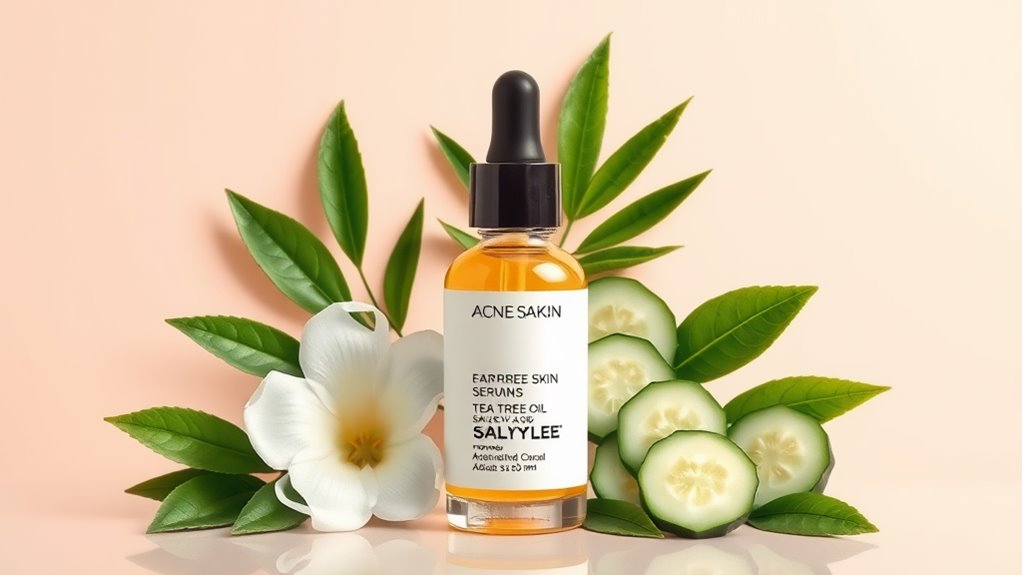How to Calm Sensitive Skin in 3 Simple Steps
If you’ve ever dealt with sensitive skin, you know how frustrating it can be. You might find that certain products or environmental factors trigger flare-ups. Fortunately, calming your skin doesn’t have to be complicated. By identifying your triggers and establishing a gentle skincare routine, you can greatly improve your skin’s health. Let’s explore how to maintain your skin barrier and keep irritation at bay.
Key Takeaways
- Identify and avoid triggers by keeping a journal of flare-ups and noting associated products or environmental factors.
- Establish a gentle skincare routine using mild, fragrance-free cleansers and soothing moisturizers to minimize irritation.
- Maintain skin barrier health with hydrating ingredients like ceramides and antioxidants to strengthen and protect your skin.
- Incorporate a hydrating serum and barrier cream for enhanced moisture retention throughout the day.
- Limit product use and always test new products on a small area to prevent potential reactions.
Identify Your Triggers
Have you ever wondered what causes your sensitive skin to flare up? Identifying your triggers is essential for effective sensitive skin care.
Start by examining your environment—pollution, climate changes, and allergens can all provoke reactions. Next, take a closer look at your products; fragrances, alcohols, and harsh chemicals often compromise your skin’s barrier.
Keep a journal to document flare-ups alongside the products and situations you encounter. This practice helps you spot patterns and pinpoint exact triggers.
Don’t forget to reflect on dietary choices, as certain foods can also contribute to sensitivity. By understanding these influences, you can tailor your sensitive skin care routine to minimize irritation and promote overall skin health.
Mastery begins with awareness, so get proactive in identifying your triggers.
Establish a Gentle Skincare Routine
To establish a gentle skincare routine, focus on selecting products that nurture rather than irritate your sensitive skin.
Begin with a few essential steps to create a calming regimen:
-
Cleanser: Choose a mild, fragrance-free cleanser that removes impurities without stripping natural oils. Look for soothing ingredients like aloe or chamomile.
-
Moisturizer: Opt for a lightweight, hydrating moisturizer that contains ingredients like hyaluronic acid or ceramides to lock in moisture and maintain skin balance.
-
Sunscreen: Daily sun protection is vital. Select a mineral sunscreen with zinc oxide or titanium dioxide to shield your skin without causing irritation.
Maintain Skin Barrier Health
Since your skin barrier acts as the first line of defense against environmental stressors, maintaining its health is essential for sensitive skin. Prioritize hydration, nourishment, and protection to strengthen this barrier. Choose products with ceramides, hyaluronic acid, and antioxidants. Also, avoid harsh chemicals that can compromise your skin’s integrity. Incorporating ingredients like fading dark spots can also help improve overall skin tone.
| Step | Action | Purpose |
|---|---|---|
| Hydration | Use a hydrating serum | Boosts moisture retention |
| Nourishment | Apply a barrier cream | Supports skin structure |
| Protection | Wear sunscreen daily | Shields against UV damage |
| Avoid Irritants | Choose gentle formulas | Prevents further irritation |
Frequently Asked Questions
Can Diet Affect Sensitive Skin Conditions?
Absolutely, your diet can impact sensitive skin conditions. Eating anti-inflammatory foods, staying hydrated, and avoiding allergens helps reduce flare-ups. Pay attention to how certain foods affect your skin, and adjust your diet accordingly for better results.
Is It Safe to Use Retinol on Sensitive Skin?
Using retinol on sensitive skin can be tricky. Start with a low concentration, apply it sparingly, and monitor your skin’s reaction. If irritation occurs, consider alternatives or consult a dermatologist for personalized advice.
How Often Should I Exfoliate Sensitive Skin?
You should exfoliate sensitive skin once a week. This frequency helps remove dead cells without causing irritation. Always choose gentle exfoliants, and listen to your skin’s response to adjust as needed for best results.
Are There Specific Ingredients to Avoid for Sensitive Skin?
When caring for sensitive skin, avoid harsh ingredients like alcohol, fragrances, and sulfates. These can irritate and exacerbate your skin’s sensitivity. Instead, opt for soothing, gentle ingredients that nurture and protect your skin’s natural barrier.
Can Stress Exacerbate Sensitive Skin Issues?
Yes, stress can definitely exacerbate sensitive skin issues. When you’re stressed, your body produces cortisol, which can lead to inflammation and irritation. Managing stress through relaxation techniques can help maintain your skin’s health and resilience.
Conclusion
By identifying your triggers, establishing a gentle skincare routine, and maintaining your skin’s barrier health, you can effectively calm sensitive skin. Keep a journal to track flare-ups, choose mild products, and always protect your skin from the sun. Don’t forget to stay hydrated with serums and barrier creams to lock in moisture. With these simple steps, you’ll nurture your skin and reduce irritation, paving the way for a calmer, healthier complexion.





